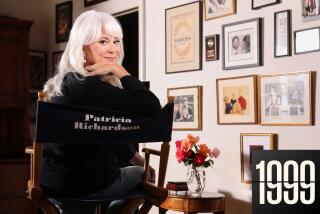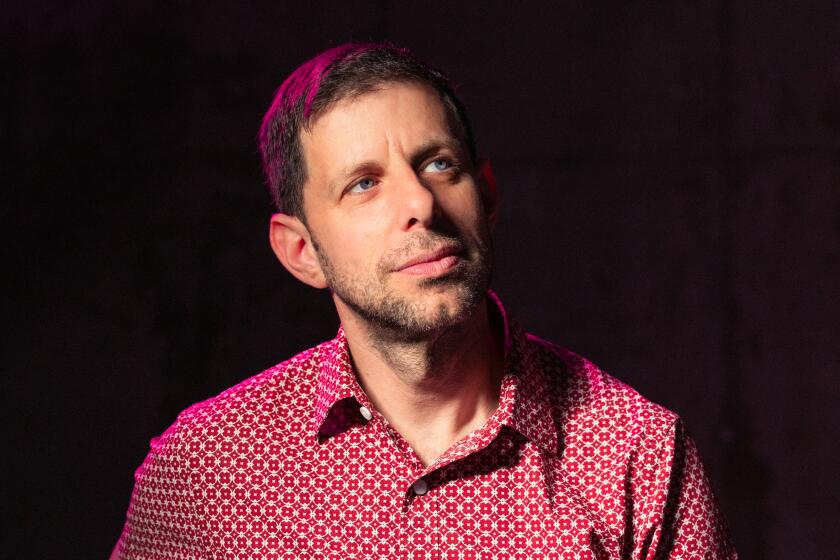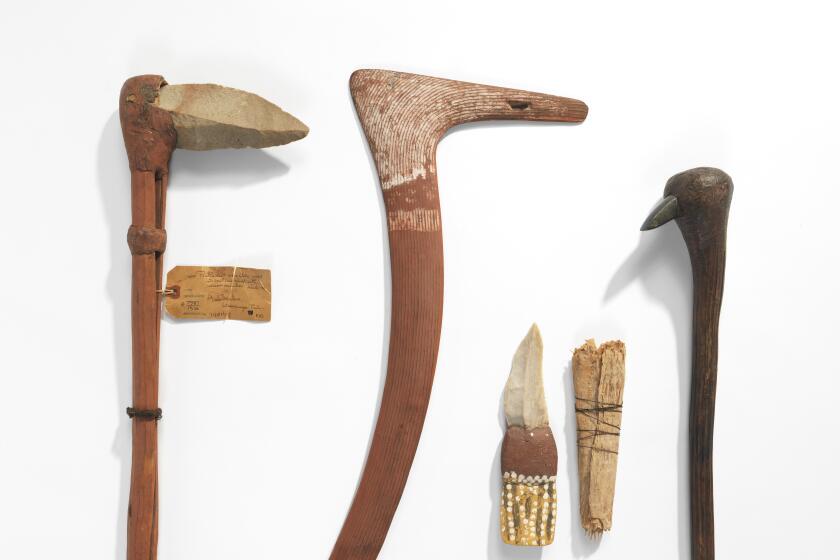Bringing Puppets to Life . . . and Death
Drifting between the worlds of the living and the dead, ghosts are a perfect subject for puppetry or animation--and director Ping Chong uses both in his magical multimedia spectacle “Kwaidan: Three Japanese Ghost Stories,” which opened a five-performance run on Thursday in the Freud Playhouse at UCLA.
The 70-minute trilogy (no intermission) begins with a journey through a rural landscape derived from ancient scroll-paintings. It ends in contemporary Tokyo with a miracle under the golden arches of McDonald’s. A demon who eats human flesh shares the stage with teenagers in grotesque haircuts who order Quarter Pounders, but as long as the leading characters can tell them apart, and follow orders from the Other Side, happy endings are definitely possible.
Enlisting the talents of designer Mitsuru Ishii and puppet coordinator Jon Ludwig, “Kwaidan” features humanoid rod-puppets ranging in size from 12 inches total to those boasting 2-foot heads. But the biggest puppet on view is the set itself: a formal, black temple of wonders with sliding doors on several levels, circular apertures that sometimes become peepholes for enormous staring eyes, and three rectangular panels that can serve as isolated stages or combine in a vast panorama.
Projected images designed by Jan Hartley artfully compress space (taking us down into a darkening valley) and time (the Westernization of Japan), heightening the long wait that each of the major characters must endure to make his peace with the dead.
Adapted from a celebrated collection of stories by Lafcadio Hearn, the tales all dramatize the weight of the past upon the present. Juxtaposing a human actor with puppets of various sizes, “Miminashi-Hoichi” shows a talented musician nearly destroyed by the wrathful spirits of a long-lost war: a living artist endangered by his lifeless audience.
In “Jikininki,” a wandering priest must solve the mystery of a disappearing corpse and a hermitage that materializes as readily as its suffering, long-dead inhabitant. The answer involves the enduring legacy of evil. Finally, in “The Story of O-tei,” a lover’s promise proves stronger than death, radical changes in fashion or the transformation of the environment: another enduring legacy reincarnated.
Emphasizing cinematic fluidity, the production style encompasses tricks of scale (a tiny puppet replaced by a larger version, for example) to give theatrical equivalents of long shots and close-ups. Indeed, Chong twice provides dramatic overhead perspectives on the action, linking his characters and their environments.
In addition, a rich array of uncredited environmental sound effects and a wealth of ravishing nature images--butterflies fluttering in a garden, bats soaring across the moon, even a pesky fly--suggest a world teeming with life. And the frequent use of shadow puppets incorporates another kind of traditional Asian puppet idiom to keep the focus on the more dimensional leading characters.
Beyond its other impressive achievements, “Kwaidan” represents a comprehensive and inspiring statement about the artistic resources available when creating contemporary puppet theater for adults. UCLA finds the event “appropriate for ages 12 and up,” but individual parents should decide whether or not the violent plot points and otherworldly mood of the production will lead their children to fear finding monster eyes staring through their windows or a severed ear in their Chicken McNuggets.
Originally performed in 1998, “Kwaidan” was commissioned by the Center for Puppetry Arts in Atlanta and brought to UCLA by a constellation of six arts institutions and sponsors. The puppeteers/actors on Thursday included David Ige, Pamella O’Connor, Lee Randall, Fred C. Riley III and Don Smith, with five others (including Chong) credited for recorded voices. Liz Lee designed the atmospheric lighting.
*
* “Kwaidan” continues tonight at 8 and Sunday at 2 p.m. in the Freud Playhouse on the UCLA campus in Westwood. $9 (students)-$40. (310) 825-2101.
More to Read
The biggest entertainment stories
Get our big stories about Hollywood, film, television, music, arts, culture and more right in your inbox as soon as they publish.
You may occasionally receive promotional content from the Los Angeles Times.






